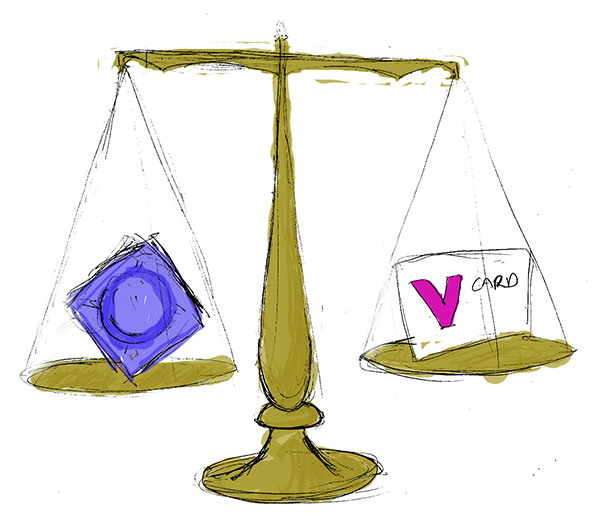Sex was never an issue in my upbringing and culture. It was never discussed, debated or joked about outside the context of matrimony.
Especially for women, it was assumed that you would be wearing that pure white dress the day you were married, with no sexual encounters whatsoever beforehand.
Needless to say, this, coupled with missing the infamous fifth grade sex ed video, brought some naivete and plain obliviousness.
Though the decision to lose or maintain one’s virginity is ultimately a personal one, familial and other environmental influences simply cannot be ignored.
Abstinence is just as viable and respectable a choice as protecting oneself during sex. But limited information creates ignorance and a denial of the realities of sex in adulthood.
My sexual education became a conglomeration of clips of “Sex and the City,” Trojan condom ads and playground rumors. When no other means of influence are available, media outlets can become the only sources of information on sexual education. Romanticization of the act replaces concrete facts and critical information on safe sex practices.
“I just feel that the media has influenced a lot of decisions in terms of when individuals have sex,” said second-year international development studies and sociology student Ben Sangthongkum, who said that he is sexually active.
Today, virginity has become such an explosive topic that the question of whether it even matters must be asked. With the competing spheres of abstinence-only and safe-sex education, the question of whether we are avoiding unwanted consequences of the act or just creating more Bristol Palin-like scenarios arises. The daughter of the former vice presidential candidate admitted herself that abstinence-only education is not “realistic.”
A study by the Centers for Disease Control showed that among 12- to 18-year-olds, those who took virginity pledges in high school were less likely to use contraception compared to those who did not take the pledge.
Of course, risk for STIs and pregnancy was just as likely among both groups despite the average 18-month delay in first sexual contact for the pledge group.
Are we then fruitlessly clinging to our puritan roots and being prudes, or does maintaining one’s virginity until marriage have some larger significance beyond tradition?
The double standard that emerges is no doubt widespread. You just can’t deny the fact that women who have premarital sex are seen in a different light compared to men.
It’s the difference between a “slut” and a “player,” and what invariably arises is a Madonna-whore complex with women forced into one caste or the other.
“A lot of the virginity movement stuff is mired in a real fear of female sexuality and ignorance of women’s sexual pleasure,” said Jessica Valenti, author of “The Purity Myth,” in a May interview with Jezebel.com.
“A large part of their message is that women don’t enjoy sex as much as men and that’s why it’s important for us to be chaste. The only time it seems to be OK for women to enjoy sex is within the confines of a marriage.”
Although college presents a very unique set of circumstances, the criteria on which we base our sexual decisions do not change.
UCLA is a relatively liberal campus, and the accessibility of condoms and other means of birth control make it a welcoming environment for both the sexual rookies and the sexually seasoned.
One study by the National Health and Social Life Survey reported that 6.2 percent of women and 10.8 percent of men aged 18 to 24 had not engaged in vaginal intercourse.
Jacquelyn Loran, a third-year sociology student, said that she is sexually active but has never felt pressure to have sex.
“Sex to me has always been a personal act or a personal choice, and so I have never felt pressure, being in college, to have sex,” Loran said. “That is the stereotype ““ that everyone’s having sex.”
Though religious beliefs are a major factor in the virginity debate, they are not always the only reason for abstaining.
“There is a big stigma. They pretty much say that everyone is doing it all the time,” said first-year global studies student Dennis Mabasa, who said that he is not sexually active. “Sometimes there is a pressure, but at this point, I realize that I don’t really care what other people do; I don’t need to fit into any type of social norm. I just want to do what I want to do.”
Regardless of the decisions that individuals make, the most influential people in our lives ““ parents, friends and institutional leaders included ““ have a responsibility to present all options equally and fairly.
With someone like Pope Benedict XVI, the leader of the world’s estimated 1 billion Catholics, stating that condoms are not the answer to AIDS, and that “on the contrary, it increases the problem,” it really is no wonder that ignorance in matters of sex is an issue of such magnitude.
STIs and pregnancy are among the consequences of sex, no doubt about it.
However, if we stick to such outdated scare tactics and old wives’ tales, we cannot expect to prepare youth when they are faced with that first sexual experience.
A lack of information can only fuel unhealthy decisions with unwanted results. We are building up sex into such a gargantuan issue that at times it seems our values and morals depend on this single act. Losing one’s virginity is a significant personal decision that should not be belittled.
However, when accurate and necessary information is denied once we are old enough to make adult decisions, we find ourselves unprepared to handle these issues.
If you are ready to have “the talk,” e-mail Gharibian at
